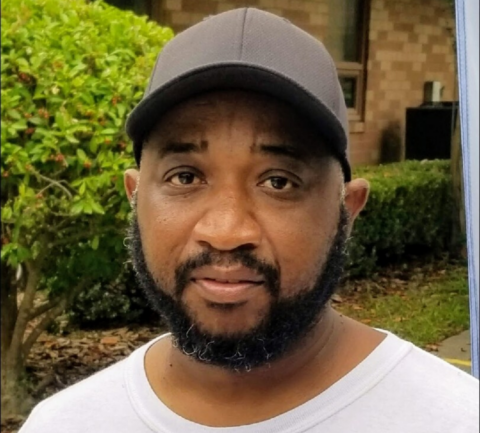So says Anthony Green, a student at the Turning Leaf Project. And he should know: his life began differently from so many of our other students. He had a happy childhood, a stable family life – they should have added up to a happy, stable life for him. But Anthony lost his way, addicted to the financial ease granted by the street life, and he had to learn the hard way that dead ends can destroy years of your life.
This is Anthony’s story.
Anthony grew up in Allendale, South Carolina, the third in a group of four brothers. Both his parents were steadying forces in his life; they worked hard to provide for their growing sons. “Mama went extra above and beyond to make sure we had,” he says. The brothers were tight, and Anthony’s father took him to and from baseball practices. He had dreams of professional ball.
Theirs was a close-knit neighborhood. His grandparents lived close, and the neighbors looked out for each other’s kids. If a child broke a rule, a neighbor might discipline him, then tell his parents. “Sometimes you got three or four beatings for one thing,” says Anthony fondly. Of course they got beatings; they were kids. Besides, there were birthday parties, too, and all sorts of other childhood events. His father gave him a Mazda pickup truck for his 16th or 17th birthday.
His brothers all chose the straight and narrow path; so did his friends. But Anthony chose a different way.
It started when he was 16 or so. He was in a store, goofing around with friends, playing at shoplifting. He picked up an item, cuffed it, then put it back. When he picked it up again, he was grabbed and dragged to the back of the store. The funny thing is, though, “I had money in my pocket. I don’t know why I did it. Sometimes you do things without thinking.” He spent the night in jail before his brothers came to get him, and he never shoplifted again.
But he was still a teenager, and if there’s one thing teenagers love, it’s a good party. His next brush with the law was a result of too much of that. It was senior cut day, and Anthony was at the beach with his friends. On the way home, he lost control and flipped his truck in a serious wreck that could have had deadly consequences. Luckily, Anthony was able to walk away and go for help. When a state trooper came, he gave Anthony a breathalyzer test, and it was off to jail for a DUI. This was a huge hit to Anthony. “It slowed me down,” he says, “because I disappointed my parents. I had to call my pops from jail. He hung up on me but he came to get me out the next day. It hurt him bad; it was the truck he had given me. He didn’t talk the whole way home, he was so mad.”
His mother took a different tack, taking him out for a long walk that day to try to talk some sense into him. “’Slow it down,’ she said. ‘Stay out of trouble. You could have died,” he says. And he knew she was right.
Anthony beat the charge in court, so in the end it was less a life lesson and more a temporary inconvenience. In retrospect, he says, it might have been better had he been more steeply punished for the DUI. It might have been enough to keep him straight.
Instead, as he hit 18, 19 years old, working during the day at a grocery store, he discovered a different lifestyle. At first it was just clubbing and partying, but as he observed the people around him supplementing their day job incomes through selling drugs, he realized he could do it too. “The money was so fast,” he says. “I’d have to work a whole month to see the money I made selling marijuana in a few hours.”
The cash and the lifestyle became an addiction to him. He’d make over $1000 (and often more) weekly to supplement his income working for a yard service. He was never arrested for selling drugs but was picked up once on a simple possession charge. He bonded out, and was right back to it, all through his 20s and 30s. “It’s a stressful life,” he says. “It’s a pain and a headache dealing with people. You’re worried about getting robbed, losing your life, and you have to balance your real job and pleasing your customers. Plus you have to avoid the police.”
There’s the lying, too. His family wanted him out of the lifestyle. His friends and girlfriend did, too. But he’d tell them he wasn’t doing it anymore. “In the end, you’re only lying to yourself,” he says.
Because the lifestyle always catches you in the end.
Anthony’s end came in 2010. He was 36 years old and had been living the lifestyle for almost two decades. He knew something was off; he’d seen the same cars around him all week, but he was working on an addition to his house so he had plenty else on his mind. He got up super early to get breakfast for his crew one morning. As he stood there, giving the girl at the counter his orders, she told him he’d just been blocked in. He turned around to see the local sheriff. “Mr. Green,” he said. “You have to come with us.”
On the way to Anthony’s house, the sheriff asked if he knew what was going on. He didn’t, but as they pulled up to his property, he knew it was bad. There were 40-50 federal SUVs surrounding the house. The federal agents were already inside. They had kicked in the door, terrifying Anthony’s girlfriend, daughter, and even his grandchild. When they couldn’t find Anthony, the agents handcuffed the other adults in the house. “I hate that they got caught up in my situation,” he says.
The feds caught him on a conspiracy charge. They tapped a customer’s phone and recorded Anthony making deals. They took him to a federal holding facility, from where he bonded out while he fought the charges. Anthony spent almost a year going back and forth to court before finally being sentenced to ten years, the mandatory minimum for a conspiracy charge. He should have gone straight to prison, but he asked the judge for three weeks to finish up a remodeling job. The judge granted the time, but it was the most stressful point in Anthony’s life. “I damn near drank myself to death stressing,” he says. “I went from around 200 pounds to 160, and I wasn’t even trying. It was just stress.” After the job was done, he bowed to the inevitable and turned himself in.
Prison was a whole new world. He did his best to keep his head down, knowing that good behavior meant going to places with lower levels of security and better environments. He prayed, kept in contact with his family, and walked the track as much as possible. He worked as an electrician, did trash pickup, and was even a cook. Holidays were hardest – especially his first year – but the guys in prison understood and supported each other. The biggest blow came when Anthony’s nephew was shot and killed while he was locked up; he couldn’t go to the funeral or support his brother through his grief. The eight and a half years – the mandatory minimum for his 10-year sentence – passed slowly by, and life went on without him on the outside.
Today Anthony lives in a halfway house, where the rules are stricter than they were in prison. He’s working hard at Turning Leaf. “I’ve learned to humble myself and to be patient,” he says. He loves what he learns each day, calling his girlfriend on each break to talk her through the day’s lessons. His parents are thrilled with his progress, and his friends are all supporting him. He knows he found a family at Turning Leaf, too. “They’ll bend over front and backwards to help us,” he says.
He adds, “I’m Anthony Green. I’m not a bad person. I just made some bad decisions in life. Now I’m back to redeem myself. I want to work to keep others going through what I went through.”
Anthony, we know you. We see how smart you are, and how hard you’re working. We know you’ll follow your dreams and do wonderful things in the crime-free life you’re living.
Story Captured by Leah Rhyne

